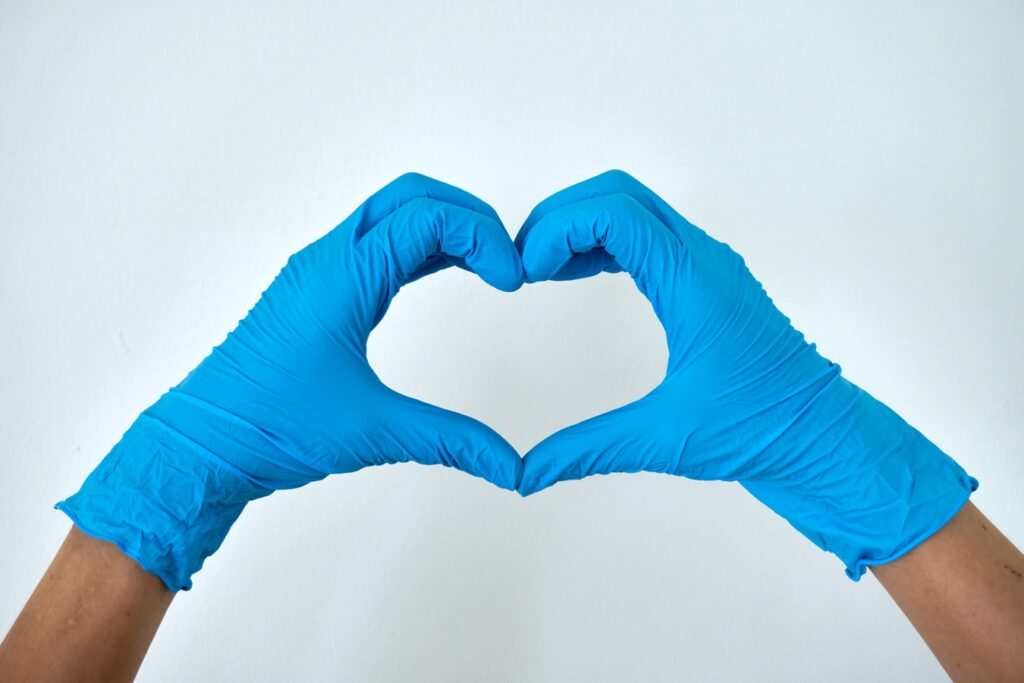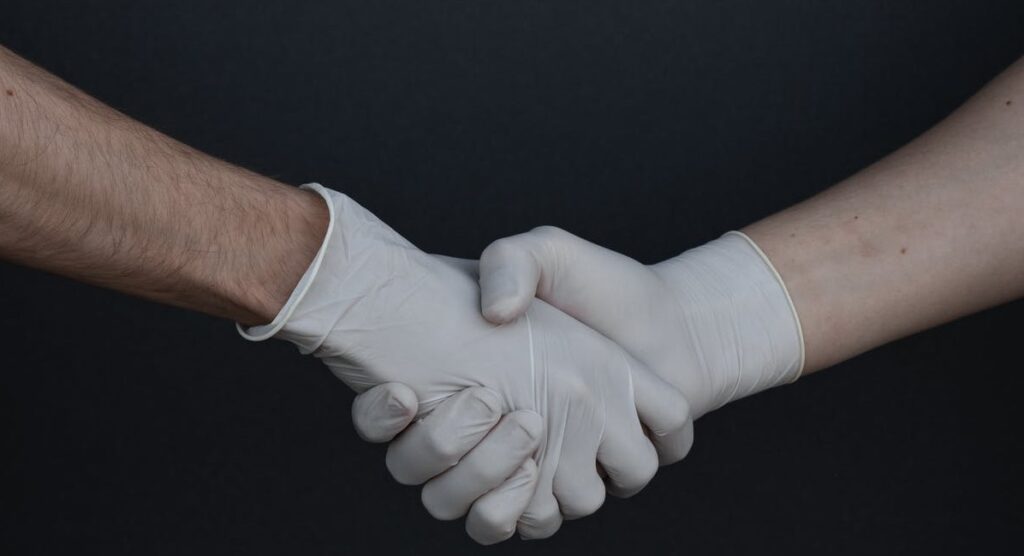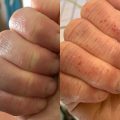Today I’ve got a guest blog post for you and as someone with a latex allergy this one really appealed to me.
I always have latex free gloves in the house for a variety of uses; peeling potatoes particularly and other vegetables when my hand eczema is bad, doing the cleaning and dusting, refilling the bird feeders, gardening and other household chores.
They are also vitally important to help avoid the spread of the covid-19 virus if you are working or shopping in any environment where you might be at risk of contact with the virus.

So here you go, Nitrile gloves for contact allergies:
Whether you have an existing skin condition, such as eczema or psoriasis, or have experienced irritation from using disposable gloves in the past, it can be tough knowing which products you can turn to when you need or want to protect your hands. Especially if you work in an environment that requires you to handle corrosive materials, or in a sterile environment such as a hospital.
This is where nitrile gloves come in!
Where can nitrile gloves be used?
Nitrile gloves are a popular choice in an incredibly wide range of industries, and for various uses. Some of their most popular uses include for cleaning and janitorial work, in hospital and clinical settings including dentists, in the hair and beauty industries, and for the handling and manufacturing of chemicals.

Why are they particularly beneficial if you have allergies?
While all disposable gloves can be beneficial for people with a contact allergy or sensitive skin, whether you wear them due to food or specific material allergies, nitrile gloves are the best choice. This is because nitrile is a hypoallergenic material, and therefore the least likely material to cause any kind of reaction.
As well as any existing allergies that people may be aware of, such as latex, wearing disposable gloves also carries the risk of causing contact dermatitis. If you’ve ever experienced this when wearing gloves previously, then nitrile gloves could be the solution for you.
Can you develop an allergy to nitrile gloves?
It is incredibly rare to develop an allergy to nitrile gloves. However, if you do think you may be allergic it’s a good idea to get a test – as you could be allergic to something else, such as your own sweat or another allergen in your environment.

What do nitrile gloves protect against?
We’ve already established that nitrile gloves are ideal for protecting your hands against irritation, but what else will they protect you from?
Nitrile gloves can protect you against bacteria, fungus and viruses, and are also resistant to a wide variety of chemicals and acids. If you do wish to wear them to protect against chemicals, it’s best to check with the manufacturer first, to ensure they’re resistant to whichever chemicals you’ll be handling. The gloves are also puncture resistant, meaning they can protect you from scratches and small cuts when handling sharps.
As well as protecting your hands, nitrile gloves can also protect the surface or material you’re working with – including glass, metal or delicate electronics.
How often can they be worn?
Knowing how often you’ll need to change gloves really depends on many factors. If you’re wearing them in a sterile or highly hygienic workplace, then you’ll probably want to dispose of a pair after each ‘use’. As soon as you’re finished with them, you’ll want to pop them in the bin and reach for a fresh new pair when you begin your next task.
If you’re wearing them to protect your skin from irritants, bacteria or viruses, then you might be tempted to wear them more than once. This is a possibility, however, you’d have to be incredibly diligent about how you safely remove the gloves and store them before their next use. To achieve minimum transferral of bacteria and viruses, we recommend disposing of gloves after use. When it comes to allergies it’s just not worth taking the risk!
If you’d like to try nitrile gloves for yourself, Pronto Direct offer a wide range of affordable disposable nitrile gloves. Click here to discover their range. New customers can get 10% off at checkout!
This is a Sponsored Post.
Do you have a latex allergy? Or sensitive skin that is irritated by a lot of chores? Do you wear nitrile gloves or non-latex, latex free gloves?












Hi Ruth I have been using nitrile gloves after being tested positive to latex and latex dust which is also in balloons and other items but also had anaphylatic shock when balloons burst and ended up intensive care for 8 hours and being watched for a further 4 hours before being allowed home afterwards very scary as alit of shop advertising is done on balloons which means I can’t go in a shop using them for this incase they burst
Hi Ian, Sorry to hear about that reaction, it sounds truly terrifying. I do wish there was an alternative to latex balloons. I’m also allergic to latex but not as badly as you. They are used so often in shops aren’t they? I’m so pleased that most doctors, nurses and dentists now have the non latex kind. I used to have to carry a stash to take with me as otherwise I was getting reactions all the time. Thanks so much for you comment. Thanks for sharing too. I hope it will make people think about what balloons to use. There are ones made from foil that can be used to make things safe for all consumers. Stay safe!
Another great post. I concur with the writer who says that nitrile allergy is rare. In thirty years I have never seen a case. We can test for latex allergy via a GP referral to some of the tertiary allergy centres see http://www.bsaci.org for the location of UK NHS clinics
Thanks Ruth
Andrew